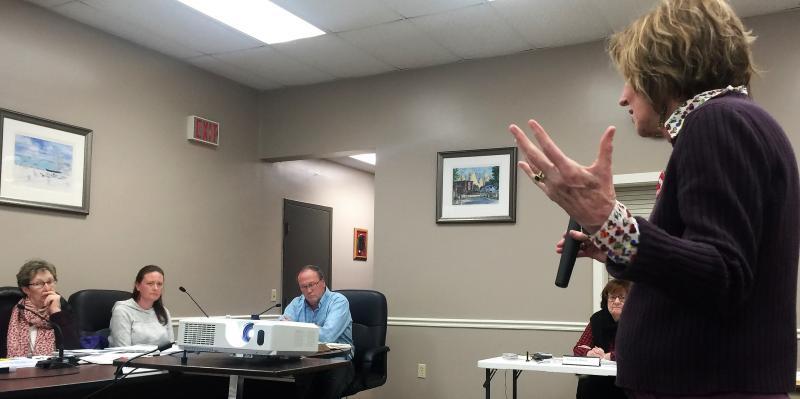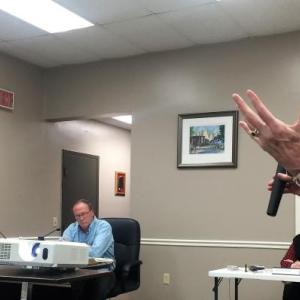Town attorney speaks to east side proposals
Selectmen discussed proposed changes on Atlantic Avenue in a section by section review Jan 28. Town attorney John Cunningham also presented his justifications for recommending the proposed ordinance changes as legally sound, a departure from independent planner Mitchell Rasor's assessment at the last board meeting that the proposals are not in line with the 2015 comprehensive plan.
Cunningham outlined the differences between comprehensive plans and ordinances: One is a set of philosophical guidelines from a committee of municipal officers and community members and the other is a law set forth by the recommendations of a planning board, drafted by the selectmen and passed by referendum.
“When you adopt an ordinance, it has the force of law ... the local equivalent of state statutes ... The (comprehensive plan) is a set of guidelines, it's a set of thoughts and suggestions and an expression of philosophy about how the town feels about its future development. It addresses a relatively short look into the future. It is expected to be changed from time to time.”
While the proposals do not implement all of the comp plan's recommendations, they are still consistent with the plan because they adopt and foster some of its goals, said Cunningham. There are most likely other proposals that might offer better protections, Cunningham continued, but that does not necessarily diminish the proposed ordinances.
Citing view corridors and access to the water via potential private establishments, the proposals offer improved viewshed and physical access to the water, said Cunningham. He also believes that if the town were ever brought to court over the ordinances and their relationship with the comp plan, the town is in good standing to win. The most telling evidence that an ordinance complies with a comprehensive plan is when registered voters approve it, he said.
“To say that the proposed amendments do not go as far as they could in implementing the recommendation of the comprehensive plan is not at all the same as finding that they are incompatible with the plan.”
With no intentions to change any of the proposals, selectmen identified some areas they expect the public to show interest or concern for at the Monday, Feb. 11 public hearing. Denise Griffin said she agreed with Rasor's assessment that the town should reconsider allowing banks, churches and private yacht clubs in the limited commercial district. Griffin also expressed concern that the proposals mandate second floor residences over commercial businesses when the town has no clear definition for “upper floor” and “lower floor.”
“I don't see any compelling data to restrict the east side more so than the downtown district … There's no way for us to regulate what type of commercial business goes into whatever the lower floor is.”
Broadband
Boothbay Town Manager Dan Bryer and Selectman Kristina Ford spoke to the board about broadband and what the towns should expect after getting the $7,500 Maine Community Foundation grant.
The grant's purpose is to help communities figure out how they could expand broadband, so the next logical step is creating a committee and a scope of work for that committee, said Ford.
With many ways in which broadband expansion can improve quality of living – from young entrepreneurship to telemedicine and the ability to comfortably and safely age in place – Ford said the towns need to first figure out who would benefit. She suggested surveys similar to one Lincoln County Regional Planning Commission and one the Island Institute distributed in a recent study involving Edgecomb, but with questions tailored to Boothbay and Boothbay Harbor.
Ford proposed both boards of selectmen and town managers look over the surveys and provide comments on how to best reach community members and business members through the surveys.
Ford will meet with Island Institute’s Stephenie MacLagan Feb. 6 to gain some insight on how successful broadband committees are formed, the types of objectives a committee should have, and the overall lifespan and average end results of such a committee. She welcomes comments and suggested changes from both boards and comments from the public until Tuesday, Feb. 5.
Other business
Selectmen voted on two issues and tabled a third. The board approved new Fish Pier public use rules which discards an unused permitting process and cleans up language in a single sentence. The board also approved buying a new pickup truck for public works. After trade-in value, the truck will cost $28,000 which was budgeted in halves between last season and this season, said Town Manager Tom Woodin.
Woodin asked the board to reallocate unused funds in the harbormaster reserve account to go toward finishing the pickleball and basketball courts which will cost about another $53,000. The reserve account was created in anticipation that the harbormaster would need a new boat, but since the town was gifted a new boat in 2015 by Kathryn and Henry Woods, the funds, which total about $23,000, sit unused.
Having used the reserve account to buy new motors for the boat, Woodin does not anticipate an immediate need for the funds. The board decided to table the recommendation until it sees an update on where the town budget stands and a breakdown of remaining work on the courts.
Financial Officer Julia Latter said the town’s revenue and expenses, year to date, total $5,622,698 and $5,169,082, respectively. The total accounts payable are $112,142.42 and the bank balance is $2,055,226.82. Tax collection is at 68 percent.
The next meeting is at 7 p.m. Monday, Feb. 11 in the meeting room of the town office. At 6 p.m.,the public hearing will be held on the east side zoning proposals.
Event Date
Address
United States
























